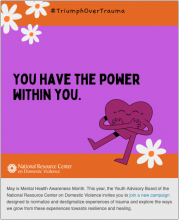This issue of the PreventIPV Newsletter offers resources that help us nurture and celebrate the strength in our survivorship on the pathway to prevention.
VAWnet News Blog
This TAQ explores strategies for cultivating equanimity in the face of collective challenges, emphasizing how collaboration will sustain us in the work to end domestic violence.
This edition of the NRCDV newsletter highlights free upcoming trainings and awareness campaigns, newly released resources, and more.
In this TAQ, Dr. Johnanna Ganz discusses the concept of moral injury in domestic and sexual violence advocacy, its impact on career sustainability, and strategies for managing harm.
What should leaders keep in mind as they find themselves leading an organization during a turbulent time? There are no easy and perfect answers to these questions. In this TAQ, NRCDV's Patty Branco offers some musings for leaders in the anti-violence field.
This TAQ offers strategies for cultivating hope when things feel challenging in our work to address and prevent domestic and sexual violence.



















